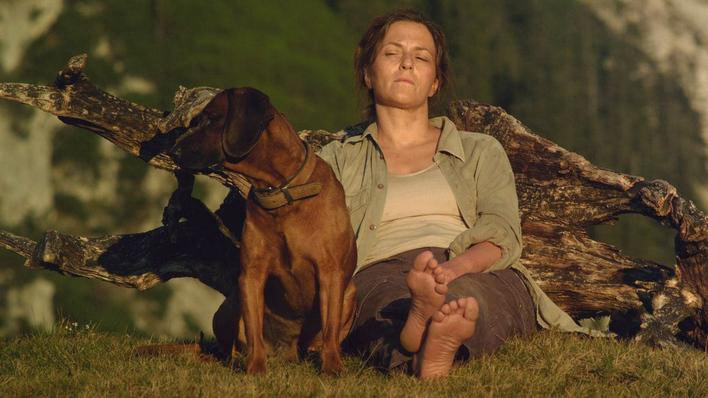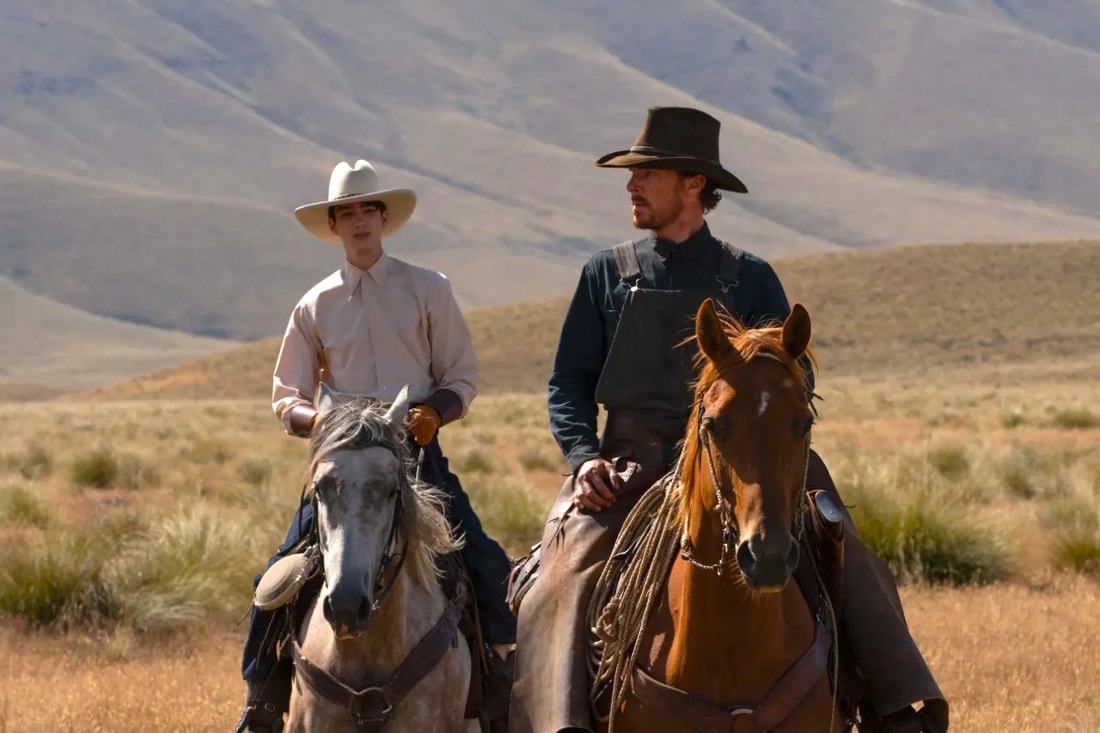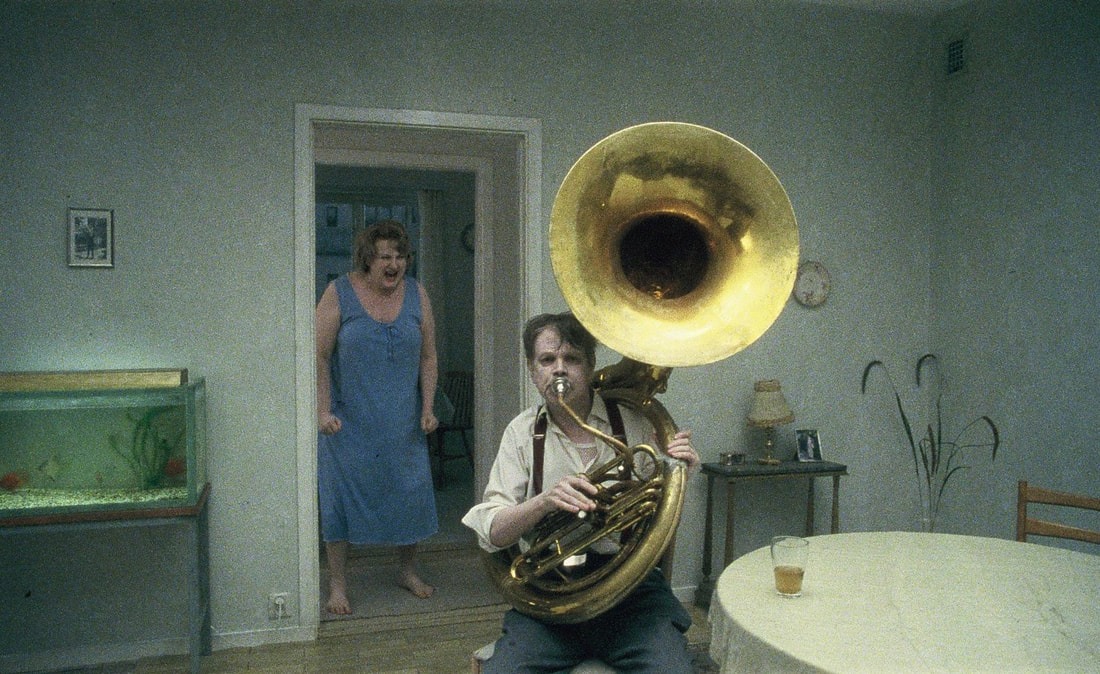
Goran Stolevski’s 2020 debut film You Won't Be Alone is a poem. There is almost no dialogue between characters, but we are able to hear the heroine’s inner voice as she learns about the world around her. She has no education and has been raised in isolation, so the words she speaks to herself are disjointed and sometimes lack grammatical structure. This allows Stolevski to explore language without the limitations of rational prose. In one scene, she reflects on her newfound place in a village, “To the woman, you are glass. To the man, you are water.” Her words, her searching eyes, and the beautiful and mysterious landscape through which she wanders, all coalesce into poetic rhythms and metaphors that transcend the narrative. There is a chronological story, but it is the heroine’s observations that are most compelling.
The film begins with a peasant woman living in the rural mountains of Macedonia. She is unexpectedly visited by a grotesquely disfigured witch, also called a “wolf eatress.” The witch, whose name is Maria, finds the peasant woman’s infant daughter and is about to eat her when the mother bursts in and tries to stop her. The woman frantically constructs a desperate bargain. She convinces Maria to spare the baby until it is 16, and then take it as an apprentice.
It’s a horrible bargain, but the mother is in a state of panic as she watches Maria hungering after the infant. The mother hides her poor daughter in a cave and raises her in secret. She names her Nevena, and never allows her to venture out of the cave. Nevena is left alone for long stretches of time. Without outside stimulation, she is mentally undeveloped and barely able to understand language. She never speaks to any of the other characters in the film, making her, for all intents and purposes, mute.
Without revealing all the details, the film is the story of Nevena’s leaving the cave and exploring the world. There are witches and gruesome deaths, but this is not a horror film. It’s a rumination on what it means to be human and to live with other humans. For all its blood and guts, it is still a gentle film, a quiet and curious, but also fearless, meditation on mortality.
Maria finds Nevena and turns her into a witch. The only outward sign of her supernatural nature is the horrific black fingernails on her hands, which she can magically hide if she so chooses. As a witch, Nevena can change herself into any form, but she must kill whomever or whatever she wishes to transform into. It is this power that fuels the film. Nevena spends time as a child, as several different women, a man, and a dog.
Whatever form she takes, she is still not like the bodies she inhabits. Nevena is an outsider, and as such, she has a special vantage point from which to examine the world and its workings. She tries to learn the ways of the villagers, but is mystified by them. She takes the form of a peasant farm wife, and suffers the hardship of poverty and the abuse of a cruel husband. After some time, she deduces, “When the man is in the room, you are not a woman. You are stew. You are bread. Your place is inside his palm. You trickle out. Like water, trickle out around him.” In a different guise, she experiences romantic love and passion. She discovers her body and her sexuality, but all the while from inside a human skin that is not hers. She is removed, not fully invested or integrated into the social fabric so crucial to human existence.

A witch is a nightmare summoned by a fearful patriarchy. She is a woman with power. A woman who can manipulate nature. The patriarchy sees itself as rational, and so contrasts women as emotional. This is underlined by the 18th and 19th-century belief that humans are dangerous animals who must keep a tight grip on civilization in order to prevent the chaos of our animal nature from dragging us all into ruin. In his book Civilization and Its Discontents, Freud wrote, “It is impossible to overlook the extent to which civilization is built up upon a renunciation of instinct.” Similarly, Hobbs writes in Leviathan, “That a man be willing, when others are so too, as far forth as for peace and defense of himself he shall think it necessary, to lay down this right to all things; and be contented with so much liberty against other men, as he would allow other men against himself.”
Traditionally, witches are depicted as ragged forest dwellers wandering, filthy and naked, through the shadows. Their magic is fueled by things like mushrooms, rabbit bones, frog eyes, and snake venom. They bend nature to serve their lascivious desires. They are the dark opposite of a “proper woman.” They serve as a contrast between the godly, demure lady, and the wanton beast of uncivilized nature.
Even proper ladies were suspect in 19th-century society. Terms like “glamour” and “bewitch” connected women to untoward influence over men. Patriarchy required that men be strong. A man had to have courage and be able to defend himself, but a woman could hurt a man no matter how strong he might be. Women seemed to understand men’s weaknesses in ways men couldn’t fathom, and this made women frightening and dangerous.

Two other films in recent memory deal with the complex vortex of power, witchery, and women. The best known is Robert Egger’s The Witch. It is the most conventional and accessible in the group. A young teen finds that her passage into womanhood is leading her away from the Christian values of her family into the darkness of the forest. A much deeper and more disturbing movie is Lukas Feigelfeld’s Hagazussa. This film has more in common with You Won't Be Alone. Hagazussa follows a woman shunned as a pariah, and her resulting descent into madness. She, like Nevena, is imbued with the musky and fecund power of the forest. She uses goat's milk, blood, hallucinogenic mushrooms, and the fluid from her vagina to harness unseen forces.
The civilized individual avoids the corporal and aspires to the divine and spiritual. The sweat and farts of the human body are embarrassments, but for Nevena, they are a curiosity. Flesh is something that can be torn and sewn. It rots and smells and bleeds, and as a witch, Nevena can wear a corpse like a piece of clothing, but she does not see herself in all the skin and sinew. She is separate, something much older, an untamed force that passes through time, untouched by mortality.
Nevena peers at humanity through someone else’s eyes and is not sure what to make of it. She wonders to herself, “It’s a burning, breaking thing, this world. A biting, wrenching thing, and yet, and yet.” At the very end of the film, she repeats, “and yet, and yet”, before the screen goes black. Her words are left unfinished. Unlike the humans around her, she, herself, will never finish. Her story will continue eternally. Her name is not Nevena, she is not a woman, nor any other earthly being, but her supernatural story is not completely unlike our own experience. The body we have at 8 is not the body we have at 16 or 40. The same is true for our minds. Like Nevena, we are an idea that temporarily identifies with a physical form. We are often distressed by how that form changes over time, but unlike Nevena, we have no choice.
We would like to believe that we are a self that is somehow independent of our mind and body. It helps temper the anxiety of being mortal, but were we truly independent from our bodies, and detached from our mortality, we would be detached from life like Nevena. For her, life is a common and ephemeral thing without value. We, as mortals, feel that we possess something special that we must keep safe. Nevena can see past this and may understand humanity in a way we cannot, but she will never understand our fears, or how those fears fuel our attachment to each other and ourselves.

If you enjoyed this article you might also enjoy this - https://filmofileshideout.com/archives/examining-mitchell-lichtensteins-teeth/



